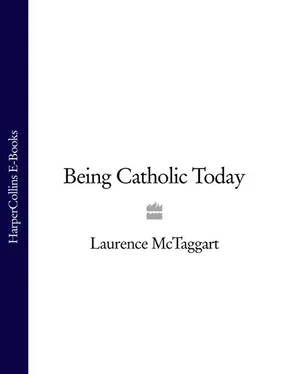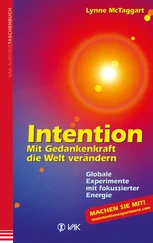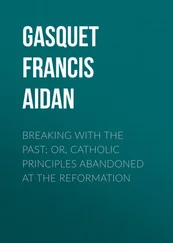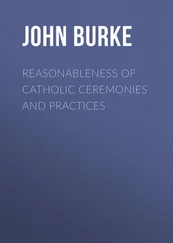Not for long – the voice was loud and insistent, ‘Father, Father!’ The man was standing in front of me with his face close to mine, and it dawned on me that it was me he was talking to. His name was Ian, and his general appearance such that I was not going to be anything but polite. He wanted to know about Lazarus.
‘Who?’ Lazarus, he explained as though to an idiot, was the man Jesus raised from the dead. Had he gone to heaven on dying or not? Because if he had, and Jesus then brought him back to earth by resurrection, he must have been a bit ****ed off with Our Lord. I replied with honesty that I had not thought about the problem before. This he found hard to take. I was a priest, I had done all that study, and I could not answer an obvious question. ‘And another thing, Father …’ Several more questions followed, until Ian had to go and catch his train to get to Glasgow in time for his criminal trial for robbery with violence. He expected about ten years minimum. He wrung my hand and begged me to pray for him every day, especially to Our Lady, who always looked after him.
In our short time together I did learn that he thought the Church was a great thing, would be lost without it, and hadn’t been near a church since his marriage to a pregnant seventeen-year-old, which ended after he was sent to jail for beating her up a few months later. But he was proud to be Catholic, read his Bible and thought hard about all kinds of issues. He was also very sad about the death of Mother Teresa of Calcutta, who, he said, was his model for Christian living.
After that, I gave up, really, and was not at all surprised when a youngish man in clerical collar and neat white jacket sat next to me on the Inverness train, and struck up a conversation. We had a very pleasant talk; he was not fully informed on Lazarus either, but we agreed on many things. One exception was his vitriolic opposition to the ordination of women (I am not vitriolic). But we were one on sacraments and most of the Catholic tradition. He was a great admirer of Pope John Paul II and his strong stance on moral and doctrinal issues.
I asked him, in that case, why he did not become a Catholic. He was, you see, a member of the Anglican Communion. He replied, rather tartly, that he already was a Catholic, but that he did not feel able to become a Roman Catholic, and became rather tetchy. Further enquiry revealed that he felt he had a duty to look after his parishioners, who were largely of the same mind, and to ‘pope’ would be to abandon them. He had decided that to stay within the Anglican Church would be an effective witness to its catholic and apostolic roots.
Perhaps I should explain the problem. The Reformation in this country, starting in the sixteenth century and continuing until the late seventeenth, was not a straightforward affair, and there were always some who followed the break with Rome and papal authority, but wished to retain the Catholic doctrinal heritage: sacraments, a strong view of priesthood etc. Others wanted to adopt a fully Protestant view of the church and its life. Historically, this resulted in the compromise of a broad Anglican church, with a liturgy and structure that allowed both tendencies, ‘high’ and ‘low’, to live side by side. The more ‘catholic’ Anglicans tend to attach much weight to being catholic and apostolic, but still reject a strong papacy and, usually, more ‘modern’ doctrines, such as papal infallibility and the Immaculate Conception. At the same time, English Roman Catholics (I’ve run out of adjectives that satisfy everyone, but you know what I mean) tend, with justification, to be jealous of their identity as Catholic, kept through times of persecution, and say that you are either in communion with Rome or you are not Catholic.
So, what does it mean to be catholic ? What does it mean to be Catholic ? Is there a difference? And why should it matter anyway? We have just met three people with different answers to all those questions. For the anguished clergyman, to be Catholic is to have beliefs that can be traced back to the apostolic church of the first century and to the words of Jesus. For the angry father, it is to belong to an organization established by Christ, and to keep the commandments it has given in his name. For the delinquent, it is to know that the Church is there, and that this means that God is with him somehow. The father would say that the vicar is catholic, perhaps, but not Catholic; the vicar would say that the father holds on to superstitions that have nothing to do with pure Catholicism; Ian, if he could articulate his thought, would say that both are stuck in irrelevant sidelines.
Jesus gives us a fairly hefty clue to our dilemma:
Go and learn the meaning of the words: I want mercy and not sacrifice. Indeed, I have come to call the righteous, not sinners.
Matthew 9:13
I’m sorry, I’ll read that again:
Go and learn the meaning of the words: I want mercy and not sacrifice. Indeed, I have come to call not the righteous, but sinners.
It is surely possible to assume that being Catholic is something to do with answering that call. My three acquaintances would each acknowledge that. Every catholic, or Catholic, is motivated by the call of Christ to follow him, or else they are not Catholic, or even catholic, at all. This does not mean that the call leads only into the Roman Catholic Church, and that people outside are not called, or do not respond fully to that call. Nor is it to say that, if the ‘call’ is there, it does not matter about how you act or think or what you believe, and certainly not whether you belong to any particular ‘visible’ church. Such questions lie ahead of us.
But Jesus’ words imply a set of priorities. The context of the saying is important. He has been asked by the Pharisees why he eats with ‘tax collectors and sinners’. Tax collectors were in the employ of the occupying Romans, and thus doubly unpopular as traitors to their nation and its religion. Pharisees aimed to keep the Law of Moses and the various Jewish traditions in their entirety. A sinner was, in the view of the Pharisees, anybody who was not a Pharisee. There are plenty of sinners around today, and also no lack of Pharisees. Which are you? Or are you a bit of both?
Here is a simple and relatively harmless example, but a surprisingly common one. A lady comes to confession. She doesn’t have much to mention, a few cross words and the like. But she failed to go to Mass for three Sundays in a row. She knows this is so bad, she thinks it is a mortal sin. It is tempting to comfort her: ‘Lots of people don’t go to Mass at all for years, most people miss from time to time.’ But that would be wrong because, for her, this clearly matters. So, I ask why she stayed away, and am shocked to the core by her answer. I am shocked because it reveals a far greater, more deadly fault. She missed Mass because she was confined to bed by influenza. Maybe one should laugh, tell her not to be so silly; how can you be expected to go to Mass if you are ill? After all, the sabbath was made for man, not man for the sabbath.
But that is the greater fault, and I stand indicted, along with all of you and the whole Church. This simple, obvious, common-sense message that we are only expected to attend Sunday Mass if it is physically and morally possible has been obscured. How? And why? The answer is manifold.
A ‘liberal’ might say that the Church has become full of legalistic misunderstandings. Following church rules is invested with a kind of magic: do this, and you will be all right. Jesus has some tough things to say about people who rely on external observances, and about those teachers who lay heavy burdens on the poor in spirit. It is only now, one might say, after the Second Vatican Council, that we are recovering the real intentions of Christ, losing the sterile additions, superstitions and clericalism of the Middle Ages and Counter-Reformation, and so coming to a true freedom. The hierarchy resists this, at the price of making old ladies think they will go to hell if they have the flu, and thus miss Mass.
Читать дальше












